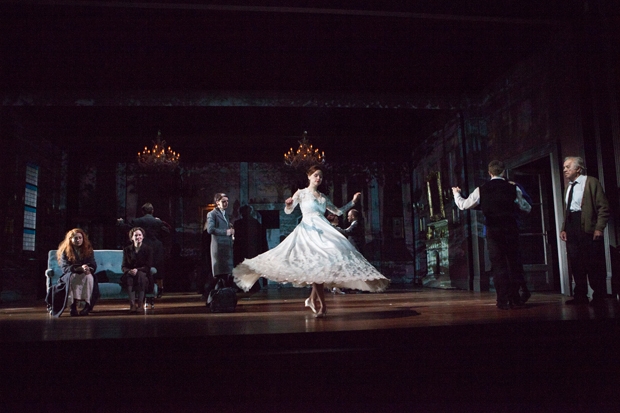A masterpiece at the National. A masterpiece of persuasion and bewitchment. Croatian word-athlete Tena Stivicic has miraculously convinced director Howard Davies that she can write epic historical theatre. And Davies has transmitted his gullibility to Nicholas Hytner, who must have OK’d this blizzard of verbiage rather than converting it into biofuel and sparing us a hideous Balkans ballyhoo.
Certainly the play is conceived on a grand scale. Location: a Zagreb mansion. Timeline: 1945 to 2011. Characters: several generations of clever proles plus one dangling aristo. It opens on a note of sourness and corruption. A blonde Marxist stunnah seduces a top commissar who buys her off with the freehold to a townhouse occupied by some rich bloodsuckers. The snooty vermin are kicked out. Enter the noble plebs. They’re all in favour of communal ownership except when it comes to communal ownership of something they want. Like the house. A flappy young heiress, made homeless by the new arrivals, asks permission to squat in her former bedroom, and she’s grudgingly allowed to remain so long as she pays her way by stitching the boots of the downtrodden poor. Everyone detests her except for her lady’s maid, who used to launder her smalls and clearly suffers from Stockholm syndrome.
We hop forwards and backwards between various historical pinchpoints. The family expands. Daughters are born and marry. More daughters sprout. Croatia’s shifting destiny is imparted to us in gobbets of gluey chitchat. ‘Yugoslavia’s fucked,’ says an armchair expert in 1990. He’s among the more imaginative and eloquent characters on display. And this is the difficulty. The architecture of the script is impressive but Stivicic has stuffed her big tent with chippy know-alls, motormouth professors, and Dictionary Corner pea-brains who jabber jabber jabber at each other non-stop, for 65 years, in an unvarying register of competitive truculence. Even Bernard Shaw would have found this play too wordy.
It doesn’t help that all the characters dislike nearly all the other characters. There’s a lot of gratuitous ugliness here as well. Some of the wittering womenfolk get assaulted by their husbands. One of these thumpy love affairs is acted out on stage, with sickening brutality, for no reason at all other than sexual titillation. Not enough violent porn on the internet? Try the National.
The play owes debts to Doctor Zhivago and The Cherry Orchard that it can’t repay. The ownership of the house becomes an issue in the final act, so the full cast are arranged around a family table to deliver one of the defining specialisms of Bad Theatre: a non-stop screaming match. This one seems to last for as long as it would take a paramecium to evolve into a mammoth. By the final curtain I think I knew who’d got the house but I wasn’t sure from whom. And I certainly didn’t care.
Some plays put you off within minutes. Some within seconds. Hope at the Royal Court opens with the deputy leader of a Labour council rehearsing a speech about ‘the cuts’. A witticism strikes him. He adds an ‘n’ and denounces ‘the cunts’ with weary and repetitive hostility. ‘We live in an age of cunts.’ That was it. I shrank in my seat, like a wintering mole, and prepared for two hours’ hibernation. I was wrong. The action shifted and expanded. Engaging characters popped up. The play developed into an absorbing portrait of a bankrupt Labour borough dealing with austerity. Sure, this fictional town is blessed with virtuous and high-minded leaders. There are no chauffeured Mercs for shifty mayors here. No off-book deals filling criminal pockets. Just decent politicians grappling with tough choices. The characters are quirky and easy to like. Stella Gonet plays a brusque and manipulative Labour leader who is also vulnerable and funny. There’s a stroppy teenager, played by Tommy Knight, whose verbal jousts with his dad’s luscious girlfriend are improbably precocious but they’re also hilarious.
Labour diehards will rue the play’s lack of anger, its refusal to call for strikes and riots. The left’s quiescence is addressed by George, an ageing commie, who credits the government with destroying the workers’ solidarity. ‘Instead of screaming at the bankers …we’re reporting each other for ten pounds of benefit fraud.’ What a tribute to the coalition. It can barely agree on the bedroom tax and yet its cunning leaders have fomented a civil war among millions of Labour loyalists.
This is a frank, humane, well-balanced and entertaining play. My only quibble is with the slo-mo dance routines and weird statue impersonations that are supposed to lend visual interest to certain scenes. Serious political theatre doesn’t need audition-room experiments and ‘be-a-tomato-giving-birth’ surrealism. All that junk should be eliminated at drama school. That’s why Rada was invented. Not to train actors but to cure them, where possible, of lunacy.







Comments